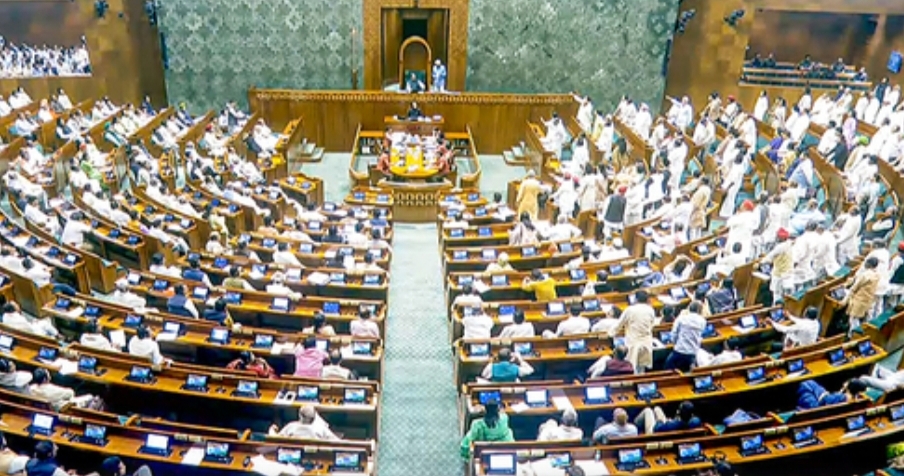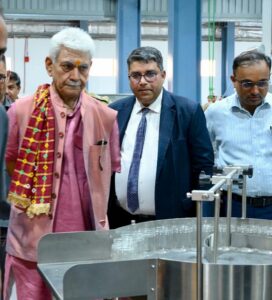The Waqf Amendment bill passed in Lok Sabha after hours long debate
•What are its implications??
•What are the controversies??
Samba Times Special

The Waqf (Amendment) Bill, 2025, is a legislative proposal in India aimed at reforming the Waqf Act, 1995, which governs the management of Waqf properties—assets dedicated by Muslims for religious, pious, or charitable purposes under Islamic law. Introduced in the Lok Sabha on April 2, 2025, by Union Minority Affairs Minister Kiren Rijiju, the bill seeks to address longstanding issues in the administration of Waqf properties, such as mismanagement, encroachments, and lack of transparency. Renamed the Unified Waqf Management, Empowerment, Efficiency, and Development (UMEED) Bill, it reflects an intent to modernize and streamline Waqf governance. However, it has sparked significant controversy, with debates centering on its implications for religious autonomy, government oversight, and constitutional rights. Below is an overview, the key changes, the controversies, statements from leaders, and its current status as of April 3, 2025.
Overview
The Waqf (Amendment) Bill, 2025, builds on a process that began with its initial introduction in August 2024. After facing opposition, it was referred to a Joint Parliamentary Committee (JPC) chaired by BJP MP Jagdambika Pal for scrutiny. The JPC reviewed the bill, incorporating 14 amendments (out of 66 proposed) by February 2025, which were later approved by the Union Cabinet. The revised bill aims to enhance transparency, accountability, and efficiency in managing India’s approximately
8.7 lakh registered Waqf properties, which span over 9.4 lakh acres and include mosques, graveyards, and educational institutions.
The government argues that the amendments address inefficiencies, such as poor surveys and title disputes, while critics see it as an overreach into Muslim religious affairs.
Key Changes
The bill introduces several significant reforms to the Waqf Act, 1995:
- Renaming and Intent: The Act is renamed the “Unified Waqf Management, Empowerment, Efficiency, and Development Act, 1995” (UMEED), signaling a focus on modernization and empowerment.
- Inclusion of Non-Muslims: It mandates the inclusion of non-Muslim members in the Central Waqf Council, State Waqf Boards, and Waqf Tribunals, alongside Muslim women and representatives from diverse Muslim communities (e.g., Shia, Sunni, Bohra, Aghakhani). This aims to broaden representation but has raised concerns about diluting Muslim control.
- Waqf by User Clarification: The original 2024 proposal sought to abolish “Waqf by user” (properties recognized as Waqf due to long-term religious use without formal documentation). The revised bill retains this status for properties registered before its enactment, unless disputed or claimed as government property, balancing tradition with legal clarity.
- Government Oversight: The bill shifts authority from Waqf Boards to state-appointed officials. For instance, a designated officer (above the rank of District Collector) now resolves disputes over Waqf status, and government properties misidentified as Waqf will revert to state ownership.
- Registration and Technology: All Waqf properties must be registered on a central portal within six months of the law’s commencement, with exceptions allowed if “sufficient cause” is shown. This digitization aims to prevent financial leakages and improve record-keeping.
- Eligibility Criteria: Only individuals practicing Islam for at least five years can dedicate property as Waqf, a rule critics argue excludes recent converts and lacks clear justification.
- Judicial Oversight: Tribunal decisions, previously final, can now be appealed in High Courts within 90 days, reducing the Waqf Tribunal’s autonomy. The Tribunal’s composition also changes, removing the requirement for a Muslim law expert and including a District Judge and a Joint Secretary-level officer.
- Separate Boards and Trusts: It proposes separate Waqf Boards for Bohra and Aghakhani communities and excludes trusts created under other laws from Waqf regulations, aiming for clarity in legal status.
Controversy
The bill has ignited a fierce political and social debate:
- Religious Autonomy: Critics, including the All India Muslim Personal Law Board (AIMPLB) and opposition parties like Congress, AIMIM, and TMC, argue that including non-Muslims in Waqf bodies and increasing government control violates Articles 14 (equality), 25 (religious freedom), and 26 (right to manage religious affairs) of the Constitution. They see it as an attack on Muslim identity and a precedent for interfering in other religious endowments.
- Government Overreach: The shift of authority to state officials, such as replacing the Survey Commissioner with a Collector or designated officer, is viewed as bureaucratic overreach. Opponents fear biased rulings in favor of the government in property disputes.
- Waqf by User Concerns: While the revised bill retains this doctrine for existing properties, the retrospective threat to undocumented Waqf sites (estimated at 4.02 lakh properties) remains a flashpoint, with fears it could destabilize mosques and graveyards amid rising communal tensions. All the home minister Amit Shah clarify regarding this in the Lok Sabha
- Lack of Consultation: Muslim organizations and opposition MPs allege insufficient stakeholder engagement, accusing the government of pushing a unilateral agenda ahead of elections, possibly to polarize voters.
- Political Divide: The ruling NDA, led by the BJP, defends the bill as a progressive reform to benefit marginalized Muslims, while the opposition INDIA bloc calls it “anti-Muslim” and a tool for political gain. Allies like JD(U) and TDP have sought tweaks (e.g., no retrospective effect, state discretion on board composition), but largely support it.
The JPC process itself was contentious, with opposition MPs alleging their 44 amendments were rejected, and dissent notes were initially redacted, though later included after protests. Public demonstrations by Muslim groups and fiery Lok Sabha debates, including AIMIM MP Asaduddin Owaisi tearing the bill, highlighted the polarized sentiment.
Why Did the Government Have to Bring This Bill to Parliament?
The decision to introduce the Waqf (Amendment) Bill, 2025, in Parliament was taken by the Indian government to address long-standing issues in the management of Waqf properties and to modernize the Waqf Act, 1995.
The government claims that this bill is essential to enhance transparency, accountability, and efficiency, which will help prevent mismanagement, encroachments, and misuse of Waqf properties.
Below are the key reasons, as articulated by the government and its supporters:
- Preventing Mismanagement and Corruption: The government asserts that complaints of corruption and irregularities in Waqf Boards are widespread. Many Waqf properties are not being used for their original religious or charitable purposes. Union Minority Affairs Minister Kiren Rijiju stated, “This bill is meant to benefit poor Muslims who have been neglected due to mismanagement.” Digital registration and government oversight are intended to curb financial irregularities.
- Resolving Property Disputes: There are numerous ownership disputes over Waqf properties across the country, including cases where government land has been wrongly designated as Waqf. The government argues that empowering officials like District Collectors and allowing appeals in High Courts will resolve these disputes quickly and fairly. Minister of State for Home Nityanand Rai said, “The amendments are in the national interest, ensuring encroachments end and properties are used for development.”
- Transparency and Modernization: Making registration of Waqf properties on a central portal mandatory aims to digitize records and bring transparency. The government believes the current system is outdated and opaque, preventing the proper utilization of over 8.7 lakh registered properties. JPC Chairman Jagdambika Pal noted, “We have struck a balance between tradition and modernity.”
- Social and Economic Development: The government claims that better management of Waqf properties will enable their use for educational institutions, healthcare facilities, and other community development initiatives, particularly benefiting marginalized sections of the Muslim community. This bill is seen as a step in that direction.
- Legal and Administrative Reforms: Limiting the powers of Waqf Tribunals and including non-Muslims in Waqf bodies reflect the government’s view that administration should be more inclusive and impartial. The government argues this will reduce religious bias and strengthen the legal process.
- Political and Strategic Reasons: Though not explicitly acknowledged by the government, some analysts believe this bill aligns with the broader strategy of the ruling NDA, particularly the BJP, to bolster its image among minority communities under the guise of reforms while signaling to the Hindu majority voter base that it is keeping an equal eye on all religious institutions. It may also serve as a tool for electoral polarization, as alleged by the opposition.
Conclusion
The government argues that bringing the Waqf (Amendment) Bill, 2025, to Parliament was necessary to improve the management of Waqf properties, eliminate corruption, and ensure their use for societal benefit. This move has been presented as a step toward administrative reform and social justice. However, the opposition views it as an attack on religious autonomy and a political maneuver, making the bill a subject of intense controversy.
Statements from Leaders
- Government (NDA):
- Kiren Rijiju, Union Minority Affairs Minister: “This bill is not about interference but about empowerment. It ensures transparency and efficiency in Waqf management, benefiting poor Muslims who have been neglected due to mismanagement. The opposition is misleading people for political gain.”
- Jagadambika Pal, JPC Chairman and BJP MP: “After extensive consultations, we’ve balanced tradition with modernity. The bill protects Waqf properties while ensuring they serve their intended purpose, not vested interests.”
- Nityanand Rai, Minister of State for Home: “The amendments are in the national interest. Digitization and oversight will end corruption and encroachments, making Waqf properties a resource for development.”
- Opposition (INDIA Bloc):
- Asaduddin Owaisi, AIMIM President: “This is a draconian law that destroys Muslim rights under Article 26. Appointing non-Muslims to Waqf bodies and giving Collectors unchecked power is a direct attack on our religious freedom. I tore the bill in protest because it’s unconstitutional.”
- Mallikarjun Kharge, Congress President: “The BJP is playing divisive politics with this bill. It undermines federalism and religious autonomy. Why no similar laws for Hindu endowments? This is a step toward polarization, not progress.”
- Derek O’Brien, TMC MP: “The government rushed this through without consensus. It’s a blatant overreach into minority affairs, and the JPC was a sham—our voices were stifled. The Rajya Sabha must reject it.”
Current Status
As of April 3, 2025, the Lok Sabha passed the Waqf (Amendment) Bill early on Thursday after an 11-hour-long debate. According to news agency ANI, 288 members voted in favor of the bill, while 232 voted against it, reflecting the NDA’s majority in the lower house (293 MPs). The bill has now moved to the Rajya Sabha, where another debate is scheduled with eight hours allocated for discussion. Given the NDA’s strength in the Rajya Sabha (125 seats), passage seems likely, though opposition resistance and potential amendments could shape the outcome. If approved, the bill will require presidential assent and subsequent notification by the central government to become law. Legal challenges, such as a pending Delhi High Court case on the Waqf Act’s validity, may also influence its implementation.
In summary, the Waqf (Amendment) Bill, 2025, aims to modernize Waqf management but faces accusations of undermining Muslim autonomy and constitutional rights. Its passage through the Lok Sabha marks a significant step, but its fate in the Rajya Sabha and beyond remains a contentious issue, with leaders from both sides framing it as a battle over governance, identity, and justice in India.
Rahul Sambyal ✍️
Executive Editor
Samba Times
Below is the response translated into Hindi, incorporating all the details, including the statements from leaders:
हिंदी में भी पढ़ें
वक्फ (संशोधन) विधेयक, 2025, भारत में एक विधायी प्रस्ताव है जिसका उद्देश्य वक्फ अधिनियम, 1995 में सुधार करना है, जो वक्फ संपत्तियों—मुस्लिमों द्वारा धार्मिक, पवित्र या धर्मार्थ उद्देश्यों के लिए समर्पित संपत्तियों—के प्रबंधन को नियंत्रित करता है। 2 अप्रैल, 2025 को केंद्रीय अल्पसंख्यक मामलों के मंत्री किरेन रिजिजू द्वारा लोकसभा में पेश किया गया यह विधेयक, वक्फ संपत्तियों के प्रशासन में लंबे समय से चली आ रही समस्याओं जैसे कुप्रबंधन, अतिक्रमण और पारदर्शिता की कमी को दूर करने का प्रयास करता है। इसका नाम बदलकर “एकीकृत वक्फ प्रबंधन, सशक्तिकरण, दक्षता और विकास (उम्मीद) विधेयक” रखा गया है, जो वक्फ प्रशासन को आधुनिक और सुव्यवस्थित करने के इरादे को दर्शाता है। हालांकि, यह विधेयक विवादों के केंद्र में है, जिसमें धार्मिक स्वायत्तता, सरकारी नियंत्रण और संवैधानिक अधिकारों पर इसके प्रभाव को लेकर बहस छिड़ी हुई है। नीचे इसका अवलोकन, प्रमुख बदलाव, विवाद, नेताओं के बयान और 3 अप्रैल, 2025 तक की वर्तमान स्थिति दी गई है।
अवलोकन
वक्फ (संशोधन) विधेयक, 2025 की शुरुआत अगस्त 2024 में इसके प्रारंभिक प्रस्तुति से हुई थी। विपक्ष के विरोध के बाद, इसे संयुक्त संसदीय समिति (जेपीसी) को भेजा गया, जिसकी अध्यक्षता बीजेपी सांसद जगदंबिका पाल ने की। जेपीसी ने फरवरी 2025 तक विधेयक की समीक्षा की और 66 में से 14 संशोधनों को शामिल किया, जिन्हें बाद में केंद्रीय मंत्रिमंडल ने मंजूरी दी। संशोधित विधेयक का लक्ष्य भारत की लगभग 8.7 लाख पंजीकृत वक्फ संपत्तियों, जो 9.4 लाख एकड़ से अधिक क्षेत्र में फैली हैं और इसमें मस्जिदें, कब्रिस्तान और शैक्षणिक संस्थान शामिल हैं, के प्रबंधन में पारदर्शिता, जवाबदेही और दक्षता बढ़ाना है। सरकार का तर्क है कि संशोधन सर्वेक्षण की खामियों और स्वामित्व विवादों जैसी अक्षमताओं को दूर करते हैं, जबकि आलोचक इसे मुस्लिम धार्मिक मामलों में अतिक्रमण मानते हैं।
प्रमुख बदलाव
यह विधेयक वक्फ अधिनियम, 1995 में कई महत्वपूर्ण सुधार लाता है:
- नाम परिवर्तन और उद्देश्य: अधिनियम का नाम बदलकर “एकीकृत वक्फ प्रबंधन, सशक्तिकरण, दक्षता और विकास अधिनियम, 1995” (उम्मीद) कर दिया गया है, जो आधुनिकीकरण और सशक्तिकरण पर जोर देता है।
- गैर-मुस्लिमों की भागीदारी: इसमें केंद्रीय वक्फ परिषद, राज्य वक्फ बोर्ड और वक्फ ट्रिब्यूनल में गैर-मुस्लिम सदस्यों को शामिल करना अनिवार्य किया गया है, साथ ही मुस्लिम महिलाओं और विभिन्न मुस्लिम समुदायों (जैसे शिया, सुन्नी, बोहरा, अघाखानी) के प्रतिनिधियों को भी शामिल किया गया है। इसका उद्देश्य प्रतिनिधित्व को व्यापक करना है, लेकिन इससे मुस्लिम नियंत्रण कमजोर होने की चिंता पैदा हुई है।
- वक्फ बाय यूजर स्पष्टीकरण: मूल 2024 प्रस्ताव में “वक्फ बाय यूजर” (लंबे समय तक धार्मिक उपयोग के आधार पर बिना औपचारिक दस्तावेज के वक्फ के रूप में मान्यता प्राप्त संपत्तियों) को समाप्त करने की बात थी। संशोधित विधेयक में इसके पहले से पंजीकृत संपत्तियों के लिए यह स्थिति बरकरार रखी गई है, जब तक कि विवाद न हो या इसे सरकारी संपत्ति न माना जाए।
- सरकारी निगरानी: विधेयक में वक्फ बोर्ड से अधिकार राज्य द्वारा नियुक्त अधिकारियों को हस्तांतरित कर दिए गए हैं। उदाहरण के लिए, वक्फ स्थिति पर विवाद को हल करने का अधिकार अब जिला कलेक्टर से ऊपर के रैंक के एक नामित अधिकारी के पास होगा, और गलत तरीके से वक्फ के रूप में चिह्नित सरकारी संपत्तियां राज्य को वापस मिलेंगी।
- पंजीकरण और तकनीक: सभी वक्फ संपत्तियों को कानून लागू होने के छह महीने के भीतर एक केंद्रीय पोर्टल पर पंजीकृत करना अनिवार्य है, हालांकि “पर्याप्त कारण” दिखाने पर छूट दी जा सकती है। यह डिजिटाइजेशन वित्तीय हेराफेरी को रोकने और रिकॉर्ड-कीपिंग को बेहतर करने के लिए है।
- पात्रता मानदंड: केवल वे व्यक्ति जो कम से कम पांच साल से इस्लाम का पालन कर रहे हैं, संपत्ति को वक्फ के रूप में समर्पित कर सकते हैं, जिसे आलोचक हाल के धर्मांतरण करने वालों को बाहर करने वाला और बिना स्पष्ट औचित्य वाला नियम मानते हैं।
- न्यायिक निगरानी: ट्रिब्यूनल के निर्णय, जो पहले अंतिम थे, अब 90 दिनों के भीतर उच्च न्यायालयों में अपील किए जा सकते हैं, जिससे वक्फ ट्रिब्यूनल की स्वायत्तता कम होगी। ट्रिब्यूनल की संरचना में भी बदलाव है, जिसमें मुस्लिम कानून विशेषज्ञ की आवश्यकता हटा दी गई और जिला न्यायाधीश व संयुक्त सचिव स्तर के अधिकारी शामिल किए गए।
- अलग बोर्ड और ट्रस्ट: बोहरा और अघाखानी समुदायों के लिए अलग वक्फ बोर्ड प्रस्तावित हैं, और अन्य कानूनों के तहत बनाए गए ट्रस्ट को वक्फ नियमों से बाहर रखा गया है।
विवाद
यह विधेयक एक तीखी राजनीतिक और सामाजिक बहस का कारण बना है:
- धार्मिक स्वायत्तता: आलोचक, जैसे ऑल इंडिया मुस्लिम पर्सनल लॉ बोर्ड (एआईएमपीएलबी) और कांग्रेस, एआईएमआईएम, टीएमसी जैसे विपक्षी दल, तर्क देते हैं कि वक्फ निकायों में गैर-मुस्लिमों को शामिल करना और सरकारी नियंत्रण बढ़ाना संविधान के अनुच्छेद 14 (समानता), 25 (धार्मिक स्वतंत्रता) और 26 (धार्मिक मामलों के प्रबंधन का अधिकार) का उल्लंघन है। वे इसे मुस्लिम पहचान पर हमला और अन्य धार्मिक संपत्तियों में हस्तक्षेप का आधार मानते हैं।
- सरकारी अतिक्रमण: सर्वे कमिश्नर को कलेक्टर या नामित अधिकारी से बदलने जैसे कदम को नौकरशाही अतिक्रमण माना जा रहा है। विरोधी पक्ष को डर है कि संपत्ति विवादों में सरकार के पक्ष में पक्षपातपूर्ण फैसले होंगे।
- वक्फ बाय यूजर चिंताएं: हालांकि संशोधित विधेयक में मौजूदा संपत्तियों के लिए यह सिद्धांत बरकरार है, लेकिन बिना दस्तावेज वाली वक्फ साइटों (लगभग 4.02 लाख संपत्तियों) पर खतरा बना हुआ है, जिससे मस्जिदों और कब्रिस्तानों की स्थिरता पर संकट पैदा हो सकता है। हालांकि गृहमंत्री ने इसके बारे में स्पष्टीकरण भी दिया है
- परामर्श की कमी: मुस्लिम संगठन और विपक्षी सांसदों का आरोप है कि हितधारकों से पर्याप्त परामर्श नहीं किया गया, और सरकार ने चुनाव से पहले एकतरफा एजेंडा थोपा।
- राजनीतिक विभाजन: सत्तारूढ़ एनडीए, बीजेपी के नेतृत्व में, इसे हाशिए पर पड़े मुस्लिमों के लिए प्रगतिशील सुधार मानता है, जबकि विपक्षी इंडिया गठबंधन इसे “मुस्लिम विरोधी” और राजनीतिक लाभ का हथियार कहता है। जेडी(यू) और टीडीपी जैसे सहयोगियों ने कुछ बदलाव (जैसे पूर्वव्यापी प्रभाव न होना, बोर्ड संरचना पर राज्य का विवेक) मांगे, लेकिन इसका समर्थन किया।
जेपीसी प्रक्रिया भी विवादास्पद रही, जिसमें विपक्षी सांसदों ने दावा किया कि उनके 44 संशोधन खारिज कर दिए गए, और असहमति नोट्स शुरू में हटाए गए, हालांकि बाद में विरोध के बाद शामिल किए गए। मुस्लिम समूहों के सार्वजनिक प्रदर्शन और लोकसभा में तीखी बहस, जिसमें एआईएमआईएम सांसद असदुद्दीन ओवैसी ने विधेयक फाड़ दिया, ने ध्रुवीकरण को रेखांकित किया।
सरकार को यह विधेयक संसद में क्यों लाना पड़ा?
वक्फ (संशोधन) विधेयक, 2025 को संसद में लाने का निर्णय भारत सरकार ने वक्फ संपत्तियों के प्रबंधन में लंबे समय से चली आ रही समस्याओं को संबोधित करने और वक्फ अधिनियम, 1995 को आधुनिक बनाने के लिए लिया। सरकार का दावा है कि यह विधेयक पारदर्शिता, जवाबदेही और दक्षता बढ़ाने के लिए आवश्यक है, जो वक्फ संपत्तियों के कुप्रबंधन, अतिक्रमण और दुरुपयोग को रोकने में मदद करेगा। नीचे इसके पीछे के प्रमुख कारण दिए गए हैं, जैसा कि सरकार और इसके समर्थकों ने बताया:
- कुप्रबंधन और भ्रष्टाचार को रोकना: सरकार का कहना है कि वक्फ बोर्डों में भ्रष्टाचार और अनियमितताओं की शिकायतें आम हैं। कई वक्फ संपत्तियों का उपयोग उनके मूल धार्मिक या धर्मार्थ उद्देश्यों के लिए नहीं हो रहा है। केंद्रीय अल्पसंख्यक मामलों के मंत्री किरेन रिजिजू ने कहा, “यह विधेयक गरीब मुस्लिमों को लाभ पहुंचाने के लिए है, जो कुप्रबंधन के कारण उपेक्षित रहे हैं।” डिजिटल पंजीकरण और सरकारी निगरानी से वित्तीय हेराफेरी को रोका जा सकता है।
- संपत्ति विवादों का समाधान: देश भर में वक्फ संपत्तियों को लेकर कई स्वामित्व विवाद हैं, जिनमें सरकारी जमीन को गलत तरीके से वक्फ के रूप में चिह्नित करने के मामले शामिल हैं। सरकार का तर्क है कि जिला कलेक्टर जैसे अधिकारियों को अधिकार देकर और उच्च न्यायालय में अपील की सुविधा देकर इन विवादों को तेजी से और निष्पक्ष रूप से हल किया जा सकता है। गृह राज्य मंत्री नित्यानंद राय ने कहा, “संशोधन राष्ट्रीय हित में हैं, ताकि अतिक्रमण खत्म हो और संपत्तियां विकास के लिए उपयोग हों।”
- पारदर्शिता और आधुनिकीकरण: वक्फ संपत्तियों का केंद्रीय पोर्टल पर पंजीकरण अनिवार्य करने का उद्देश्य रिकॉर्ड को डिजिटाइज़ करना और पारदर्शिता लाना है। सरकार का मानना है कि मौजूदा प्रणाली पुरानी और अपारदर्शी है, जिसके कारण 8.7 लाख से अधिक पंजीकृत संपत्तियों का सही उपयोग नहीं हो पा रहा। जेपीसी अध्यक्ष जगदंबिका पाल ने कहा, “हमने परंपरा और आधुनिकता के बीच संतुलन बनाया है।”
- सामाजिक और आर्थिक विकास: सरकार का दावा है कि वक्फ संपत्तियों का बेहतर प्रबंध n होगा तो इनका उपयोग शैक्षणिक संस्थानों, स्वास्थ्य सुविधाओं और अन्य सामुदायिक विकास के लिए किया जा सकेगा, जिससे विशेष रूप से मुस्लिम समुदाय के हाशिए पर पड़े वर्गों को लाभ होगा। यह विधेयक इस दिशा में एक कदम माना जा रहा है।
- कानूनी और प्रशासनिक सुधार: वक्फ ट्रिब्यूनल की शक्तियों को सीमित करना और गैर-मुस्लिमों को वक्फ निकायों में शामिल करना सरकार की उस सोच का हिस्सा है कि प्रशासन को अधिक समावेशी और निष्पक्ष बनाया जाए। सरकार का कहना है कि यह धार्मिक पक्षपात को कम करेगा और कानूनी प्रक्रिया को मजबूत करेगा।
- राजनीतिक और रणनीतिक कारण: हालांकि सरकार इसे स्पष्ट रूप से स्वीकार नहीं करती, लेकिन कुछ विश्लेषकों का मानना है कि यह विधेयक सत्तारूढ़ एनडीए, विशेष रूप से बीजेपी, की व्यापक रणनीति का हिस्सा है, जिसमें सुधारों के नाम पर अल्पसंख्यक समुदायों के बीच अपनी छवि को मजबूत करना और हिंदू बहुसंख्यक मतदाताओं को यह संदेश देना शामिल है कि वह सभी धार्मिक संस्थानों पर समान नजर रख रही है। यह विधेयक चुनावी ध्रुवीकरण का भी एक उपकरण हो सकता है, जैसा कि विपक्ष ने आरोप लगाया है।
निष्कर्ष
सरकार का तर्क है कि वक्फ (संशोधन) विधेयक, 2025 को संसद में लाना जरूरी था ताकि वक्फ संपत्तियों के प्रबंधन में सुधार हो, भ्रष्टाचार खत्म हो, और इनका उपयोग समाज के लाभ के लिए हो सके। यह कदम प्रशासनिक सुधार और सामाजिक न्याय के दावे के साथ पेश किया गया है। हालांकि, विपक्ष इसे धार्मिक स्वायत्तता पर हमला और राजनीतिक चाल मानता है, जिसके कारण यह विधेयक तीखे विवाद का विषय बना हुआ है।
नेताओं के बयान
- सरकार (एनडीए):
- किरेन रिजिजू, केंद्रीय अल्पसंख्यक मामलों के मंत्री: “यह विधेयक हस्तक्षेप के बारे में नहीं, बल्कि सशक्तिकरण के बारे में है। यह वक्फ प्रबंधन में पारदर्शिता और दक्षता सुनिश्चित करता है, जिससे गरीब मुस्लिमों को लाभ होगा जो कुप्रबंधन के कारण उपेक्षित रहे हैं। विपक्ष लोगों को राजनीतिक लाभ के लिए गुमराह कर रहा है।”
- जगदंबिका पाल, जेपीसी अध्यक्ष और बीजेपी सांसद: “विस्तृत परामर्श के बाद, हमने परंपरा और आधुनिकता के बीच संतुलन बनाया है। यह विधेयक वक्फ संपत्तियों की रक्षा करता है और सुनिश्चित करता है कि वे अपने इच्छित उद्देश्य को पूरा करें, न कि निहित स्वार्थों को।”
- नित्यानंद राय, गृह राज्य मंत्री: “संशोधन राष्ट्रीय हित में हैं। डिजिटाइजेशन और निगरानी से भ्रष्टाचार और अतिक्रमण खत्म होंगे, जिससे वक्फ संपत्तियां विकास का संसाधन बनेंगी।”
- विपक्ष (इंडिया गठबंधन):
- असदुद्दीन ओवैसी, एआईएमआईएम अध्यक्ष: “यह एक दमनकारी कानून है जो अनुच्छेद 26 के तहत मुस्लिम अधिकारों को नष्ट करता है। वक्फ निकायों में गैर-मुस्लिमों को नियुक्त करना और कलेक्टरों को अनियंत्रित शक्ति देना हमारी धार्मिक स्वतंत्रता पर सीधा हमला है। मैंने विरोध में विधेयक फाड़ दिया क्योंकि यह असंवैधानिक है।”
- मल्लिकार्जुन खड़गे, कांग्रेस अध्यक्ष: “बीजेपी इस विधेयक के साथ विभाजनकारी राजनीति खेल रही है। यह संघवाद और धार्मिक स्वायत्तता को कमजोर करता है। हिंदू संपत्तियों के लिए ऐसा कोई कानून क्यों नहीं? यह प्रगति नहीं, ध्रुवीकरण की ओर कदम है।”
- डेरेक ओ’ब्रायन, टीएमसी सांसद: “सरकार ने बिना सहमति के इसे जल्दबाजी में पारित किया। यह अल्पसंख्यक मामलों में स्पष्ट अतिक्रमण है, और जेपीसी एक दिखावा था—हमारी आवाज दबाई गई। राज्यसभा को इसे खारिज करना चाहिए।”
वर्तमान स्थिति
3 अप्रैल, 2025 तक, लोकसभा ने गुरुवार तड़के 11 घंटे की लंबी बहस के बाद वक्फ (संशोधन) विधेयक पारित कर दिया। समाचार एजेंसी एएनआई के अनुसार, 288 सदस्यों ने विधेयक के पक्ष में मतदान किया, जबकि 232 ने इसके खिलाफ, जो एनडीए की लोकसभा में बहुमत (293 सांसद) को दर्शाता है। विधेयक अब राज्यसभा में गया है, जहां इसके लिए आठ घंटे की चर्चा निर्धारित की गई है। एनडीए की राज्यसभा में ताकत (125 सीटें) को देखते हुए इसके पारित होने की संभावना है, हालांकि विपक्ष का प्रतिरोध और संभावित संशोधन परिणाम को प्रभावित कर सकते हैं। यदि मंजूर हुआ, तो विधेयक को राष्ट्रपति की सहमति और केंद्रीय सरकार द्वारा अधिसूचना की आवश्यकता होगी। वक्फ अधिनियम की वैधता पर दिल्ली उच्च न्यायालय में लंबित एक मामला भी इसके कार्यान्वयन को प्रभावित कर सकता है।
संक्षेप में, वक्फ (संशोधन) विधेयक, 2025 का उद्देश्य वक्फ प्रबंधन को आधुनिक बनाना है, लेकिन इसे मुस्लिम स्वायत्तता और संवैधानिक अधिकारों को कमजोर करने का आरोप झेलना पड़ रहा है। लोकसभा में इसका पारित होना एक महत्वपूर्ण कदम है, लेकिन राज्यसभा और उसके बाद की राह विवादास्पद बनी हुई है, जो भारत में धर्म, शासन और पहचान पर व्यापक तनाव को दर्शाती है।





